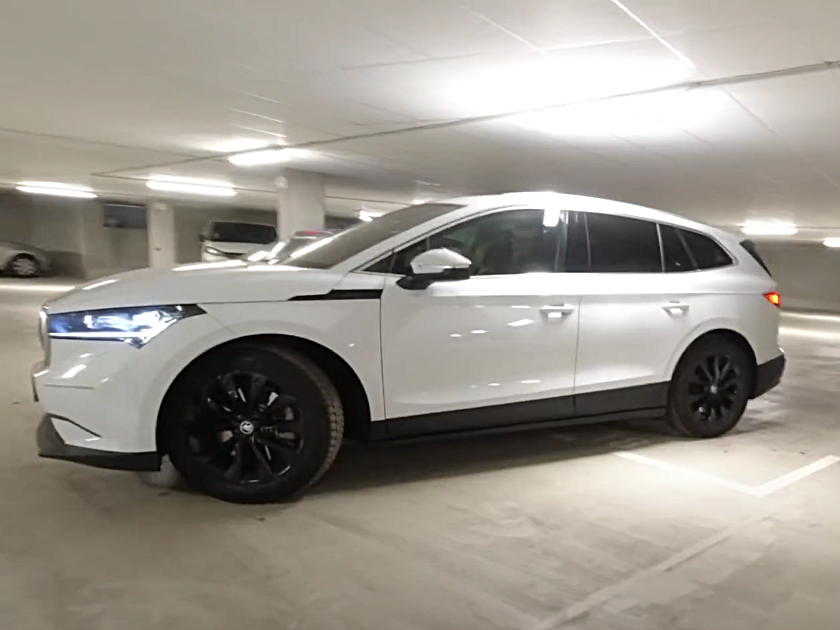 Skoda Enyaq. Photo not taken in the Netherlands. Photo: IGEMBB (@SteveundJulian) on YouTube
Skoda Enyaq. Photo not taken in the Netherlands. Photo: IGEMBB (@SteveundJulian) on YouTubeNovember was a good month for plug-in electric vehicles in the world’s largest car market (China) and also in Europe’s largest car market (Germany). In both of those, the market share of plug-ins — among passenger vehicles — exceeded 35%. In the case of China, this is based on retail figures from the CPCA, China Passenger Car Association.
And what about the Netherlands? Plug-in vehicles were about 36% of the total passenger vehicle market in November. BEVs were 25.4% (6,940 units sold) while PHEVs were 10.5% (2,869 units sold).
Also, good and steady sales of plug-in vehicles throughout the year brought the year-to-date plug-in market share to an impressive 33%.
Chinese SUV rules the PHEV market
The best-selling PHEV in the Dutch market in November — selling better than any BEV — is the Lynk & Co 01.
For several months (August, September, October), that model has been topping the plug-in sales charts in the Netherlands. A huge success for the Chinese brand.
But did it keep the title of the best-selling plug-in vehicle in November too? Well… it depends whether you’re counting the BEV and PHEV variants of the same model together. Because the two plug-in variants of the Volvo XC40, counted together (479 units of the BEVs variant + 140 units of the PHEVs variant = 619 units), outsold the Chinese plug-in hybrid (614 units) by a narrow margin.
That’s assuming the data from the RVO is complete. Also, the Volvo C40 is counted as a separate model even though it’s essentially a coupe variant of the XC40
Both brands — Volvo and Lynk & Co — share the same owner, the Chinese automotive giant Geely. The Volvo XC40 has been difficult to buy this year — apparently its production in Ghent, Belgium was halted for some time. The unavailability of the European-made Volvo was a big chance for the Chinese-made Lynk & Co 01 to fill its shoes (even if the Chinese vehicle is only available as a PHEV, with no BEV variant).
In Sweden, Volvo’s homeland, deliveries of the XC40 plummeted — more so than in the Netherlands — but prospective buyers of the XC40 PHEV/BEV did not rush to buy the Chinese SUV instead; it just kept selling in about 100–200 units each month.
In the Netherlands, however, the Chinese SUV became a hit.
And among BEVs, the first place in November goes to the Czech-made Skoda Enyaq. The Volvo XC40 BEV took the 2nd place (it kept appearing in monthly statistics throughout the second half of 2022 — sales of the BEV variant did not fall in the Netherlands as much as they did in Sweden).
Top 10 all-electrics (BEVs), November 2022:
1. Skoda Enyaq (521 units)
2. Volvo XC40 BEV (479 units)
3. Peugeot e-208 (371 units)
4. BMW i4 (306 units)
5. Volkswagen ID.4 (278 units)
6. Audi e-tron (260 units)
7. Kia e-Niro (242 units)
8. Kia EV6 (241 units)
9. Renault Megane E-Tech Electric (238 units)
10. Hyundai Ioniq 5 (221 units)
Top 10 PHEVs, November 2022:
1. Lynk & Co 01 PHEV (614 units)
2. Volvo XC40 PHEV (140 units)
3. Volkswagen Tiguan PHEV (129 units)
4. Volvo XC60 PHEV (124 units)
5. BMW 3 Series PHEV (113 units)
6. Peugeot 308 PHEV (111 units)
7. Mazda CX-60 PHEV (77 units)
8. Mitsubishi Eclipse Cross PHEV (68 units)
9. Kia Sportage PHEV (67 units)
10. Volvo XC90 PHEV (63 units)
The results year-to-date
The year-to-date plug-in market share among passenger vehicles is 33%. 58,854 BEVs (21.3% market share) and 32,270 PHEVs (11.7% market share) were sold so far this year.
Normally such an article would include a year-to-date model ranking. The problem is, I have very little data for PHEVs. Also, I’m mixing multiple data sources here — the figures for January-October come from EV Volumes (José Pontes) and RAI Vereniging, while the results for November come from the RVO (the Netherlands Enterprise Agency).
The best-selling PHEV year-to-date is the Lynk & Co 01, with what looks like 5,108 units sold.
The second place in the PHEV category possibly goes to the Volvo XC40 PHEV — using an estimate (because it’s an estimate only) provided by EV Volumes, we arrive at 2,607 units.
For BEVs, the situation is more clear:
1. Skoda Enyaq (4,968 units)
2. Peugeot e-208 (3,409 units)
3. Kia e-Niro (3,034 units)
And if the estimates for the Volvo XC40 PHEV are any good, the combined year-to-date sales of the PHEV and BEV variants of the XC40 are somewhere around 5,000–5,100 units; so, in the same range as the Enyaq or the Lynk & Co 01 PHEV.
Teslas are weirdly absent from the year-to-date ranking; you would need to scroll further down the list to find the Model Y. We will see if the usual surge of BEV sales, which happens in the Dutch market in December, happens this year too (and if so, how many of those BEVs turn out to be Teslas).
A few words about the Dutch plug-in vehicle fleet
There are now about 500,000 plug-in passenger vehicles on Dutch roads. 316,465 BEVs and 183,315 PHEVs. Together they constitute about 5.6% of all passenger vehicles in the Netherlands.
The most common one is still the Tesla Model 3: about 42,300 cars.
Note: Most of the data in the article is based on figures published by the RVO, which show about 27,300 passenger vehicles registered in November. For comparison, figures from RAI Vereniging indicate about 27,800 passenger vehicles registered in November.
___
Sources: [1][2][3][4]